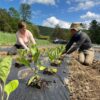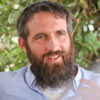“In dealing with the land – working it, taking care of it, making it bloom – we have to be constantly connected to the Divine.” The Torah portion of Ekev, the 3rd in the last book of the Torah, stretches from Deuteronomy 7:12 to 11:25. Among its topics are the blessings of obedience to God; the dangers of forgetting God; Moses recalling the making and re-making of the Tablets of Stone; the incident of the Golden Calf, Aaron’s passing, the Levite’s duties and, and the need to serve God. And, most importunately, is the emphasis of the Land of Israel’s specialness: For the land that you are about to enter and possess is not like the land of Egypt from which you have come. There, the grain you sowed had to be watered by your own labors like a vegetable garden; but the land you are about to cross into and possess, a land of hills and valleys, soaks up its water from the rains of heaven. It is a land which Hashem your God looks after, on which Hashem your God always keeps an eye, from year’s beginning to year’s end” (Deut. 11:10-12). The Land with special qualities also […]

















